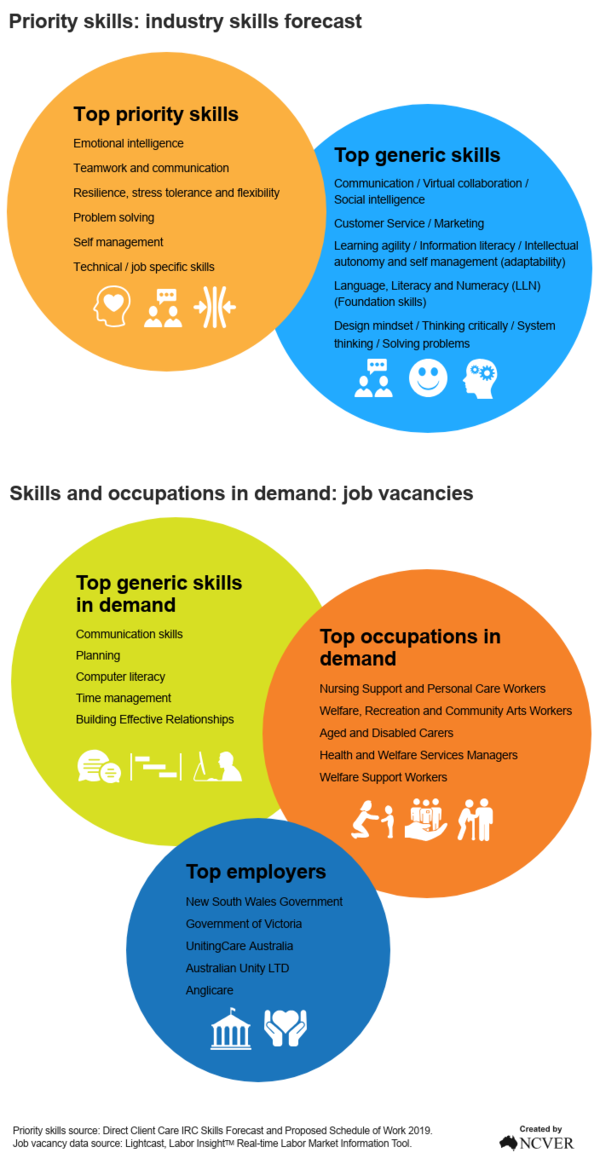
Industry insights on skills needs
The Direct Client Care and Support IRC's 2019 Skills Forecast was the most recent industry skills forecast published by the IRC, as of September 2022. It identified the top priority skills for the sector as mainly soft skills, ranging from emotional intelligence, teamwork and communication, resilience, stress tolerance and flexibility, through to problem solving and self-management, followed by technical / job specific skills.
The top five identified generic skills were:
- Communication / Virtual collaboration / Social intelligence
- Customer Service / Marketing
- Learning agility / Information literacy / Intellectual autonomy and self management (adaptability)
- Language, Literacy and Numeracy (LLN) (Foundation skills)
- Design mindset / Thinking critically / System thinking / Solving problems.
According to job vacancy data viewed in August 2022, the top requested skills by employers in the sector were communication skills. The top employers were the New South Wales Government and the Government of Victoria.
The Direct Client Care and Support IRC's 2019 Skills Forecast highlights several key challenges and opportunities for the sector, including:
- Skill shortages – needed to help those with chronic health conditions, and in the areas of dementia care and palliative care, as well a need for workers with technological and interpersonal skills
- Government policy / legislation changes – relating to the National Disability Insurance Scheme (NDIS) and government expenditure in the Aged Care sector
- An ageing workforce
- A lack of career progression, a lack of career pathways and an increased casualisation of the workforce.
Skills shortages
The sector’s client base has changed over time, with the increased prevalence of mental health and alcohol and other drug-related conditions, as well as other chronic conditions such as asthma, diabetes, obesity, and arthritis. Further, there are shortages in skills related to dementia care, palliative care, technological and interpersonal skills (such as communication), most noticeably in the aged and disability care sectors. A focus on updating the workforce skills mix therefore remains a priority. However, there were a multitude of challenges influencing skills shortages across all direct client care and support workforces, such as:
- A scarce supply of skilled trainers
- A lack of investment in workplace training, compounded by funding limitations
- Limited opportunities for continual training (for example, continued professional development)
- No formal requirement for aged care-related training before entering the aged care workforce, and the onboarding of unqualified staff
- A disassociation between components of training and industry needs (for example, skills areas such as technology, communication, customer service, negotiation, risk assessment skills, etc.)
- Poor language, literacy and numeracy (LLN) skills
- The high cost of training to both workers and employers, especially where there are no subsidised training places to meet sector demands.
A number of these challenges were also identified in the Royal Commission into Aged Care Quality and Safety Final Report: Care, Dignity and Respect, which found the aged care system is understaffed and the workforce underpaid and undertrained. It reported that workers often lacked sufficient skills and training to cater for the needs of older people receiving aged care services. Further, the sector had difficulty attracting and retaining well-skilled people due to low wages and poor employment conditions; lack of investment in staff and, in particular staff training; limited opportunities to progress or be promoted; and no career pathways.
The Commission’s recommendations sought to build on work of the sector-led Aged Care Workforce Industry Council and to educate and train the workforce, including:
- Reviewing the need for specialist aged care Certificate III and IV courses, with Commissioner Briggs recommending, as part of this review, several new units of competency be considered
- Implementing as a condition of approval of aged care providers that all workers who have direct contract with people seeking or receiving services undertake regular training about dementia care and palliative care
- Providing ongoing professional development of the aged care workforce. This includes fast-track development of accredited nationally recognised short courses, skills sets and micro-credentials (see Chapter 12, Volume 3A).
Separately, the Royal Commission also recommended all aged care providers which promote their services to Aboriginal and Torres Strait Islander people to train their staff in culturally safe and trauma-informed care (see Chapter 7, Volume 3A).
The Royal Commission into Aged Care Quality and Safety Final Report: Care, Dignity and Respect also considers aged care in regional, rural and remote areas (see Chapter 8, Volume 3A).
The Committee for Economic Development of Australia (CEDA) also examined the demand for aged care workers in 2021 and estimated within the next decade there will be a shortage of 110 000 direct aged-care workers and more than 400 000 workers by 2050. It argued that meeting the challenge requires better wages and working conditions; getting more people into training, improving training outcomes and investing in ongoing development; continued migration with new paths; investment in new technology; and, knowledge sharing and promotion of the industry.
A place-based trial of the Care Roles Skill Set developed by the Human Services Skills Organisation may help with the entry of young people into the care workforce. The Skill Set was developed in consultation with industry to rapidly upskill a ‘surge’ workforce to meet ‘unprecedented strain on the aged care and disability support’ sector in the COVID-19 pandemic. The trial explores the utility of the Skills Set for young learners entering with different levels of existing skills and employment experience.
Government policy/legislation changes
The Direct Client Care and Support IRC's 2019 Skills Forecast identified challenges associated with the implementation of the NDIS and tensions between funding arrangements and demand for residential aged care and other aged care services. According to the Skills Forecast, both funding and the costs of provision would be dominant issues across industry and were likely impact workforce areas including staff numbers and work conditions.
The Australian Government’s NDIS National Workforce Plan: 2021-2025 seeks to build a responsive and capable workforce through initiatives that address key priorities. These priorities aim to attract people to care and support sector and strengthen entry pathways, and train and support the NDIS workforce. The latter includes the development of micro-credentials and update nationally recognised training.
In addition to the workforce measures, the NDIS National Workforce Plan: 2021-2025 also prioritises regulatory measures (reduction of red tape) and the facilitation of new service models and innovation. Further, it also prioritises provision of more market information about business opportunities in the care and support sector.
The National Disability Services annual ‘check up’ of disability service providers, the State of the Disability Sector 2021 found that frustration, uncertainty and confusion were the hallmarks of the sector over the year. The report includes data from the Annual Market Survey, with providers reporting ongoing workforce issues, concerns over pricing, COVID-19 and the NDIS policy environment was uncertain. The report also includes glimmers of hope for the sector.
The Royal Commission into Aged Care Quality and Safety Final Report: Care, Dignity and Respect also considered regulatory changes as they related to educating and training the aged care workforce and recommended establishing a national registration scheme that included a mandatory minimum certificate III level qualification and minimum levels of English language proficiency; and required a mandatory minimum certificate III qualification level for personal care workers. The Australian Government accepted or accepted in principle most of these recommendations, as per Australian Government’s Response to the Final Report of the Royal Commission into Aged Care Quality and Safety (see pages 50 to 54).
The new National Agreement on Closing the Gap represents a different approach to the delivery of government services, with all Australian governments working with Aboriginal and Torres Strait Islander people, their communities, organisations and businesses. The Commonwealth Closing the Gap Implementation Plan provides a snapshot of the Commonwealth’s existing actions, strategies and frameworks that contribute to Closing the Gap. This includes the National Aboriginal and Torres Strait Islander Health Plan 2021-2031 which recognises the need for structural reform to improve access, address racism and enhance cultural safety across the whole health system. Aligning to the aforementioned National Agreement, the National Aboriginal and Torres Strait Island Health Workforce Strategic Framework and Implementation Plan 2021-2031 commits all governments across multiple portfolios to work in partnership with Aboriginal and Torres Strait Islander people to grow and strengthen the Aboriginal and Torres Strait Islander health workforce. It also aims to ensure a culturally safe and responsive health system.
Ageing workforce
The Direct Client Care and Support IRC's 2019 Skills Forecast reported the share of people aged 65 or over will increase in coming decades, as will the labour force participation rate. The implications of an ageing workforce mean the sector is likely to experience high levels of staff leaving the workforce. This presents challenges, in adapting the workplace arrangements to encourage mature-age workers to remain, and advantages, such as retaining extensive work experience.


